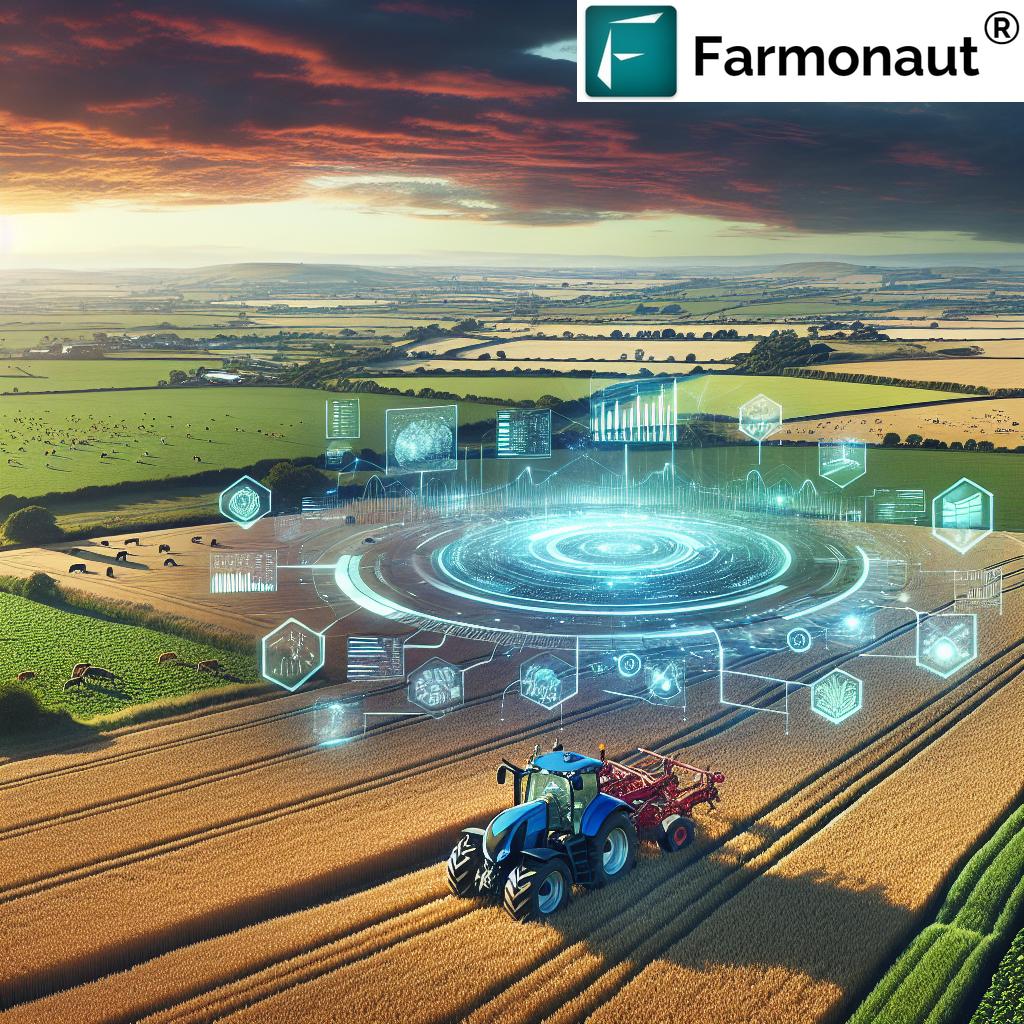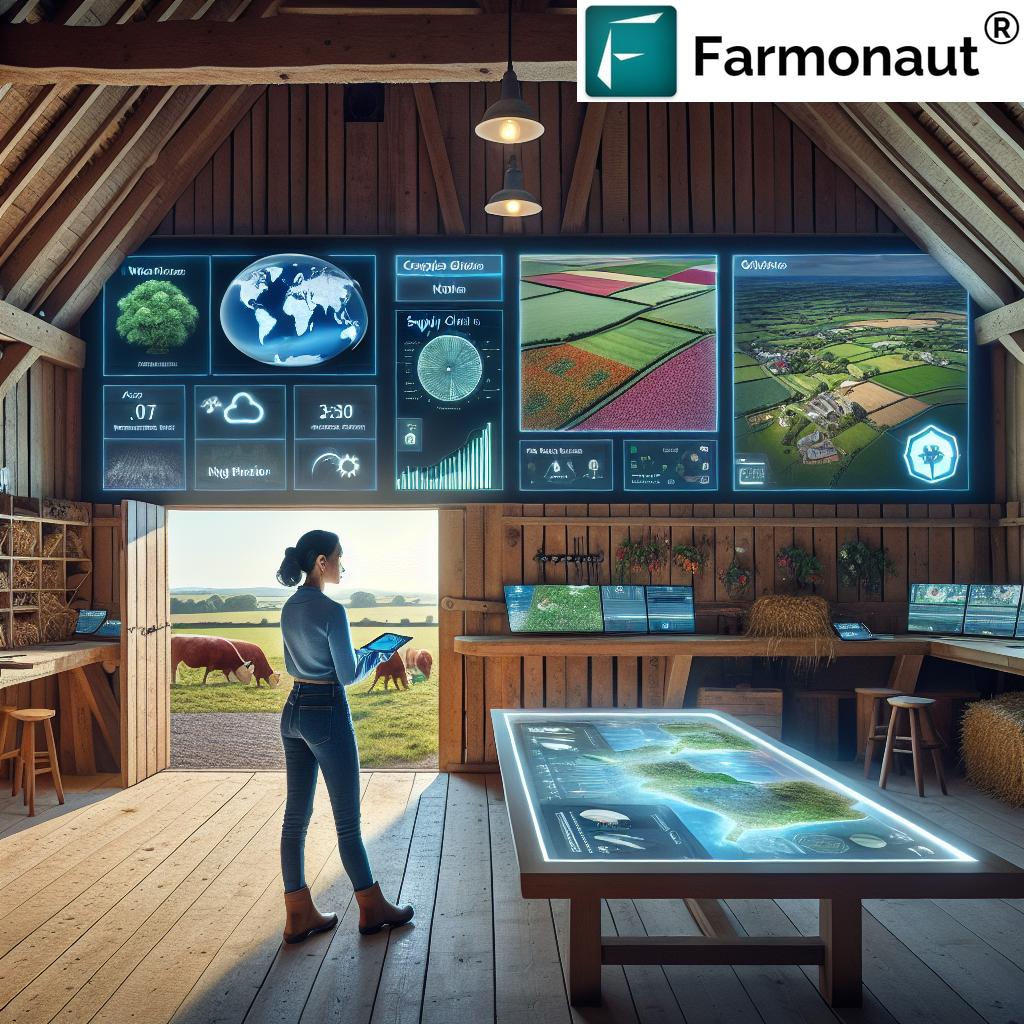UK Food Supply Chains at Breaking Point: Urgent Strategies for Farm Resilience and Food Security
“Brexit impacts and global disruptions have pushed UK food supply chains to a breaking point, affecting over 70% of farmers.”
In recent years, the United Kingdom’s agricultural sector has faced unprecedented challenges, pushing our food supply chains to the brink of collapse. As we navigate through these turbulent times, it’s crucial to understand the complex web of issues affecting our farmers, food production, and national food security. In this comprehensive blog post, we’ll explore the current state of UK agriculture, the critical challenges it faces, and the innovative strategies being developed to ensure farm resilience and food security for our nation.
The Current State of UK Agriculture
The UK’s agricultural sector is a cornerstone of our economy and society, playing a vital role in feeding the nation and maintaining our rural landscapes. However, recent events have exposed vulnerabilities in our food supply chains, necessitating urgent action to safeguard our agricultural future.
- Brexit impacts on trade and labor
- Global disruptions, including the COVID-19 pandemic
- Climate change and environmental pressures
- Changing consumer demands and market dynamics
These factors have converged to create a perfect storm for UK farmers, threatening the stability of our food production and distribution systems. Let’s delve deeper into these challenges and explore the strategies being developed to overcome them.
Critical Challenges Facing UK Food Supply Chains
To fully grasp the magnitude of the situation, we must examine the key issues affecting our food supply chains:
1. Import Difficulties
The UK relies heavily on food imports to meet consumer demand. Recent disruptions in global trade, exacerbated by Brexit, have led to significant challenges in maintaining a steady flow of imported goods. This has resulted in:
- Increased costs for imported products
- Delays at ports and border checkpoints
- Shortages of certain food items in supermarkets
2. Brexit Impacts
The UK’s departure from the European Union has had far-reaching consequences for our agricultural sector:
- Changes in trade agreements and tariffs
- Reduced access to seasonal agricultural labor
- Increased bureaucracy and paperwork for farmers and exporters
3. Global Disruptions
The COVID-19 pandemic has exposed vulnerabilities in global supply chains, affecting the UK’s food security:
- Disruptions in international shipping and logistics
- Changes in consumer behavior and demand patterns
- Increased focus on local food production and self-sufficiency
4. Climate Change and Environmental Pressures
The agricultural sector is on the front lines of climate change, facing numerous challenges:
- Extreme weather events affecting crop yields
- Changes in pest and disease patterns
- Pressure to reduce carbon emissions and adopt sustainable practices

Urgent Strategies for Farm Resilience and Food Security
In response to these challenges, stakeholders across the UK’s agricultural sector are developing innovative strategies to build resilience and ensure food security. Let’s explore some of the key approaches being implemented:
1. Diversification of Farming Practices
Many UK farmers are adopting diversification strategies to reduce risk and increase income streams:
- Introducing new crops or livestock
- Developing agritourism initiatives
- Investing in renewable energy projects on farm land
2. Equipment Modernization and Technology Adoption
Investing in modern farming equipment and technologies is crucial for improving efficiency and productivity:
- Precision agriculture techniques
- Automated systems for livestock management
- Data-driven decision-making tools
At Farmonaut, we’re at the forefront of this technological revolution in agriculture. Our satellite-based farm management solutions provide farmers with real-time insights into crop health, soil moisture levels, and other critical metrics. This data-driven approach helps optimize resource use and improve yields.
3. Improved Crop Management Techniques
Adopting advanced crop management practices can help farmers maximize yields while minimizing environmental impact:
- Integrated pest management
- Precision fertilizer application
- Crop rotation and intercropping
4. Strengthening Local Food Production
Reducing reliance on imports by boosting domestic food production is a key strategy for enhancing food security:
- Supporting local farmers’ markets and community-supported agriculture
- Investing in urban farming initiatives
- Encouraging consumers to buy British produce
5. Enhancing Supply Chain Resilience
Building more robust and flexible supply chains is crucial for withstanding future disruptions:
- Developing alternative transportation routes
- Implementing blockchain technology for improved traceability
- Fostering closer relationships between farmers, processors, and retailers
Farmonaut’s blockchain-based traceability solutions can play a vital role in enhancing supply chain transparency and efficiency.
Explore Farmonaut’s API solutions
The Role of Technology in Agricultural Resilience
Technology is playing an increasingly important role in addressing the challenges faced by UK farmers and strengthening our food supply chains. Let’s explore some of the key technological innovations that are shaping the future of agriculture:
1. Satellite-Based Crop Monitoring
Satellite technology, like that employed by Farmonaut, is revolutionizing crop management:
- Real-time monitoring of crop health and growth patterns
- Early detection of pest infestations and disease outbreaks
- Optimization of irrigation and fertilizer application
2. Artificial Intelligence and Machine Learning
AI-driven tools are providing farmers with valuable insights and decision-making support:
- Predictive analytics for yield forecasting
- Automated pest and disease identification
- Personalized crop management recommendations
Farmonaut’s Jeevn AI Advisory System is an excellent example of how AI can be harnessed to improve farm productivity and efficiency.
Learn more about Farmonaut’s API Developer Docs
3. Internet of Things (IoT) in Agriculture
IoT devices are enabling more precise and efficient farming practices:
- Smart sensors for soil moisture and temperature monitoring
- Automated irrigation systems
- Livestock tracking and health monitoring
4. Drone Technology
Drones are becoming increasingly valuable tools for farmers:
- Aerial crop surveying and mapping
- Precision spraying of pesticides and fertilizers
- Livestock monitoring in remote areas
“The UK’s agri-food sector contributes approximately £120 billion to the national economy annually, highlighting its critical importance.”
Government Support and Policy Initiatives
Addressing the challenges facing UK agriculture requires a coordinated effort between farmers, industry stakeholders, and government bodies. Several key policy initiatives and support measures are being implemented to bolster the sector:
1. The Agriculture Act 2020
This landmark legislation sets out a new framework for UK agricultural policy post-Brexit:
- Phasing out of direct payments based on land area
- Introduction of Environmental Land Management schemes (ELMs)
- Focus on sustainable farming practices and environmental stewardship
2. Seasonal Workers Pilot Scheme
To address labor shortages in the agricultural sector:
- Allows overseas workers to come to the UK for seasonal work
- Helps ensure farms have access to the workforce they need
3. Investment in Agricultural Research and Innovation
The government is increasing funding for agricultural research and development:
- Support for precision farming technologies
- Investment in crop resilience and disease resistance
- Promotion of sustainable farming practices
4. Trade Negotiations and Market Access
Efforts to secure favorable trade agreements for UK agricultural products:
- Negotiating new trade deals with non-EU countries
- Protecting UK food standards in international trade
- Supporting export opportunities for British farmers
The Role of Farmonaut in Strengthening UK Agriculture
As we navigate these challenging times, innovative technologies like those offered by Farmonaut are playing a crucial role in enhancing farm resilience and food security. Our advanced satellite-based solutions provide UK farmers with valuable tools to optimize their operations and adapt to changing conditions:
- Real-time crop health monitoring for early problem detection
- AI-driven advisory systems for personalized farm management
- Blockchain-based traceability for enhanced supply chain transparency
- Carbon footprint tracking to support sustainable farming practices
By leveraging these cutting-edge technologies, UK farmers can make more informed decisions, improve productivity, and build resilience against future challenges.
UK Food Supply Chain Challenges and Solutions
| Challenge | Severity | Proposed Solution | Farmonaut’s Contribution |
|---|---|---|---|
| Import Difficulties | High | Strengthen local food production | Satellite-based crop monitoring to optimize yields |
| Brexit Impacts | High | Diversification of farming practices | AI advisory system for informed decision-making |
| Global Disruptions | Medium | Enhance supply chain resilience | Blockchain-based traceability solutions |
| Climate Change | High | Adopt sustainable farming practices | Carbon footprint tracking and management tools |
| Labor Shortages | Medium | Invest in automation and technology | Precision agriculture tools to optimize resource use |
Looking Ahead: The Future of UK Agriculture
As we look to the future, it’s clear that the UK agricultural sector must continue to evolve and adapt to meet the challenges of a changing world. By embracing innovation, sustainable practices, and collaborative approaches, we can build a more resilient and secure food system for generations to come.
Key areas of focus for the future include:
- Continued investment in agricultural technology and research
- Development of more resilient crop varieties
- Expansion of vertical farming and urban agriculture initiatives
- Strengthening partnerships between farmers, researchers, and technology providers
- Promoting consumer awareness and support for British agriculture
Conclusion
The UK’s food supply chains are indeed at a breaking point, but with concerted effort, innovation, and strategic planning, we can overcome these challenges and build a more resilient agricultural sector. By embracing technologies like those offered by Farmonaut, implementing sustainable farming practices, and fostering collaboration across the industry, we can ensure food security for our nation while supporting our farmers and rural communities.
As we move forward, it’s crucial that all stakeholders – from farmers and policymakers to consumers and technology providers – work together to create a sustainable and secure future for UK agriculture. By doing so, we can not only address the immediate challenges facing our food supply chains but also build a stronger, more resilient agricultural sector that can thrive in the face of future uncertainties.
FAQ Section
Q1: What are the main challenges facing UK food supply chains?
A1: The main challenges include import difficulties due to Brexit and global disruptions, climate change impacts, labor shortages, and the need for more sustainable farming practices.
Q2: How is technology helping to address these challenges?
A2: Technologies like satellite-based crop monitoring, AI-driven advisory systems, and blockchain-based traceability solutions are helping farmers optimize their operations, make informed decisions, and enhance supply chain transparency.
Q3: What role does Farmonaut play in supporting UK agriculture?
A3: Farmonaut provides advanced satellite-based farm management solutions that help farmers monitor crop health, optimize resource use, and improve overall farm productivity and sustainability.
Q4: How can consumers support UK farmers and food security?
A4: Consumers can support UK farmers by buying locally produced food, participating in community-supported agriculture programs, and advocating for policies that support sustainable farming practices.
Q5: What government initiatives are in place to support UK agriculture?
A5: Key initiatives include the Agriculture Act 2020, which focuses on sustainable farming and environmental stewardship, the Seasonal Workers Pilot Scheme to address labor shortages, and increased investment in agricultural research and innovation.







